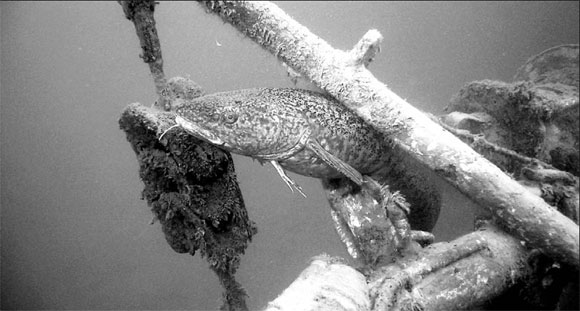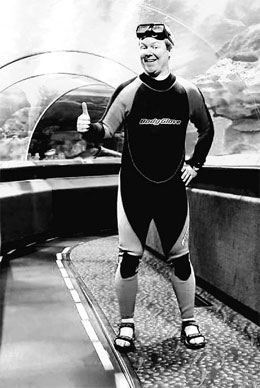Thrills and gills
|
A meter-long Siberian greyling in Lake Khovsgol, Mongolia.Kurt Moser |
Beijing is perhaps not the ideal spot for diving enthusiasts to hone aquatic skills. After all, the sailing competition during next year's Beijing Olympics will be hundreds of kilometers away in the coastal city of Qingdao, East China's Shandong Province. The concrete jungle, however, isn't void of would-be divers.
Steven Schwankert, 37, a professional American diver originally from the state of New Jersey, knows how difficult it is to find good diving spots around Beijing. But it's not impossible if one is willing to hop on a plane, train or automobile to find water.
In fact, he and a team recently completed a dive that's probably worth bragging about with friends.
Schwankert and a team of 11 international divers recently returned from Lake Khovsgol, a remote ancient body of water in Mongolia. In fact, it's so far from most people and industry that the water quality tested free of pollutants and the divers even tasted it.
"It was probably the cleanest water and air I've ever encountered," he says. "We drank from the lake every day and there was not a single stomach problem we encountered, we had no illnesses and no injuries."
It was the first time Schwankert led his own diving team, although he has participated in several others throughout his diving career. Each member of the team brought their own equipment and paid their own way for the entire trip, Schwankert says.
While they weren't the first to dive in the lake, Schwankert says his group was the first to dive there for scientific purposes. While they had a few clues about the temperature, the water quality and what they could expect before they left Beijing, they also were prepared for surprises.
The freshwater lake is 136 kilometers long, 20 kilometers wide and 262 meters deep. It's believed to be between 2 and 5 million years old and it's teeming with at least nine types of fish. Since commercial fishing is prohibited, the few Mongolians who fish there find it thriving with fish.
In addition to diving, the team tested the water and used sonar to scan for animals and sunken ships. The sonar showed some evidence of deepwater creatures at least 5 meters in length. While they couldn't eye those creatures, they came face to face with meter-long fish and spied two wooden Russian shipwrecks that sank during the 1920s.
Although the fluctuating weather was challenging and the logistical issues were difficult, Schwankert returned to Beijing, satisfied that the trip was worth the effort.
|
Steven Schwankert has forged a career as a professional diver in Beijing. File Photo |
"We had a huge number of successes and a huge number of firsts," he says. "We had the first woman to ever dive in Mongolia and she happened to be a Mongolian woman so that was particularly special."
Schwankert moved to Beijing 11 years go and is managing director and co-founder of SinoScuba, a company that was launched four years ago to provide diving classes to students at various levels. Prior to Beijing, he lived in Hong Kong and his work has taken him to Costa Rica, the Philippines and Thailand.
A few days before he departed Beijing for his Mongolian adventure, Schwankert gave a talk in front of several dozen people at Bookworm in Sanlitun. He talked about his reasons for choosing the lake, how he organized the team and some of the potential challenges they faced.
"So you may be wondering what makes someone decide 'hey I am going to go diving in Mongolia'?" Schwankert said during his talk and slide presentation. "Ok, not necessarily the most obvious diving choice. Yes, I've heard of the Philippines, yes, I have also heard of Thailand, and they're lovely diving spots "
Perhaps the choices are limited, he suggests.
"Here in Beijing, we're fairly close to desert conditions, at least as far as diving is concerned," he says.
He joked about a rare experience he and colleagues had in a reservoir several years ago outside Beijing. It offered a nice view of the Great Wall but the fun was short-lived.
"It was a fantastic diving place, the only problem was that it was part of the drinking water supply for Beijing and shortly after we discovered it, the municipal government moved to protect all the water supply around Beijing mainly with large iron fences," he told the crowd. "So imagine our surprise when we showed up one day with tanks and realized, well, I don't think they want us to dive."
It's perhaps why he's had to travel so far.
To reach the lake, the team had to fly from Beijing to Ulaanbaatar and take a connecting flight to Moron, a small city. Then it was a two and a half hour drive in four-wheel drive vehicles to the lake.
They slept in a nearby camp run by Mongolians where food was provided. The nearest town to the lake is Hatgal with a population of 500 people and it's located at the southern end of the lake.
The equipment they hauled with them during the long journey included heavy diving gears such as air compressors, 16 tanks for air, 12 sets of personal gear, three satellite phones and laptops with GPS.
While he and his team didn't come across anything that was out of this world, he was pleasantly surprised that the condition of the lake's water was good enough to drink and was void of pollutants.
Getting to the right part of the lake was a challenge since the size of the lake was breathtakingly large.
"Even having a boat, and a fast boat at that, it still took us a very, very long time to cover distances because the lake is just so vast and we had a small sonar unit and I think, without it, we would have been doing a needle in a haystack type of work," he says.
The sonar helped narrow-down the sites that appeared to be worthy of a dive.
While the temperature of the water wasn't frigid enough to keep them away, the air temperature fluctuated from one extreme to the next.
"The water wasn't as cold as we expected for the most part. Most days the weather was pretty nice but it did really get cold at night," he says. "So it's really strange to go from wearing shorts and T-shirt during the day to wearing a winter coat at night."
(China Daily 09/20/2007 page20)
















